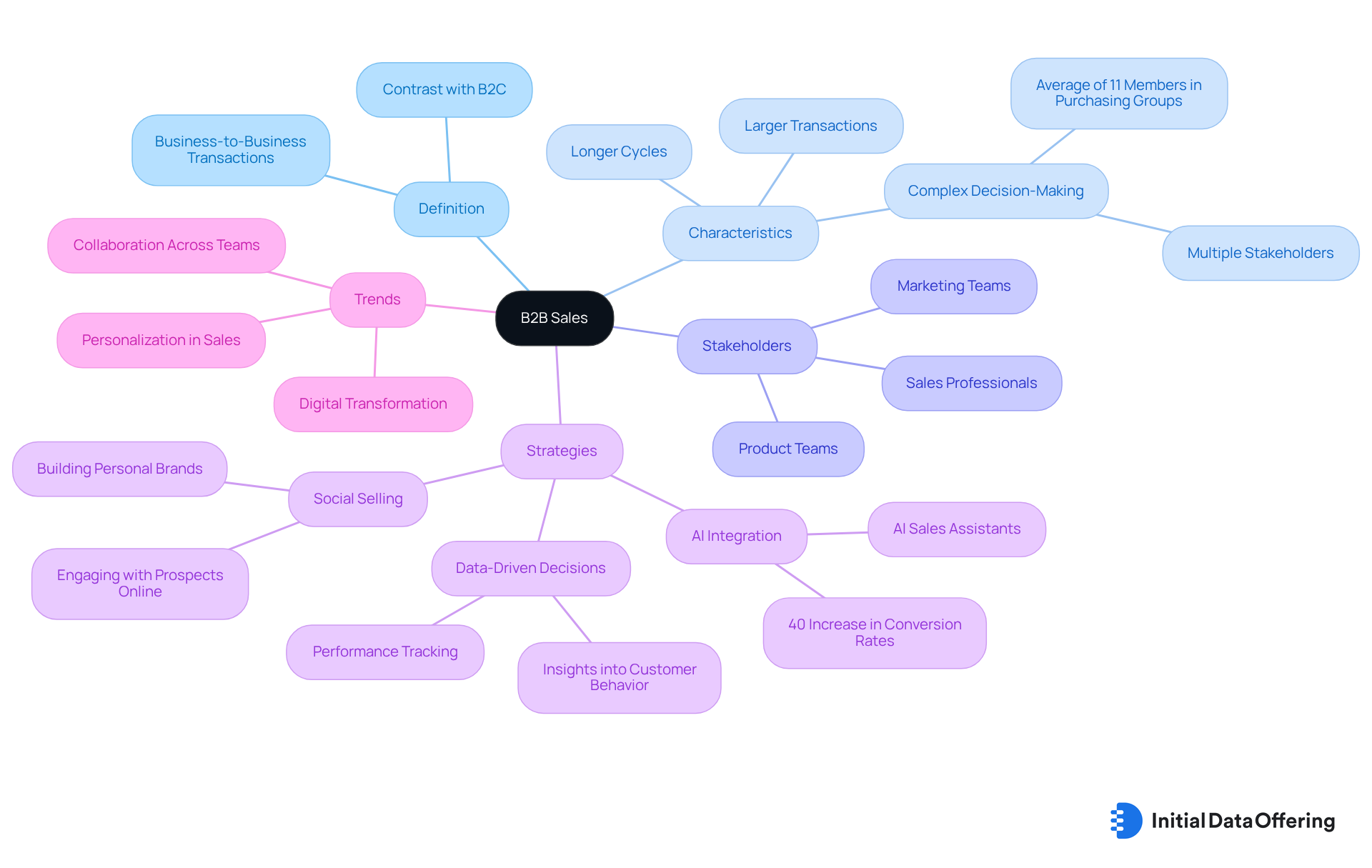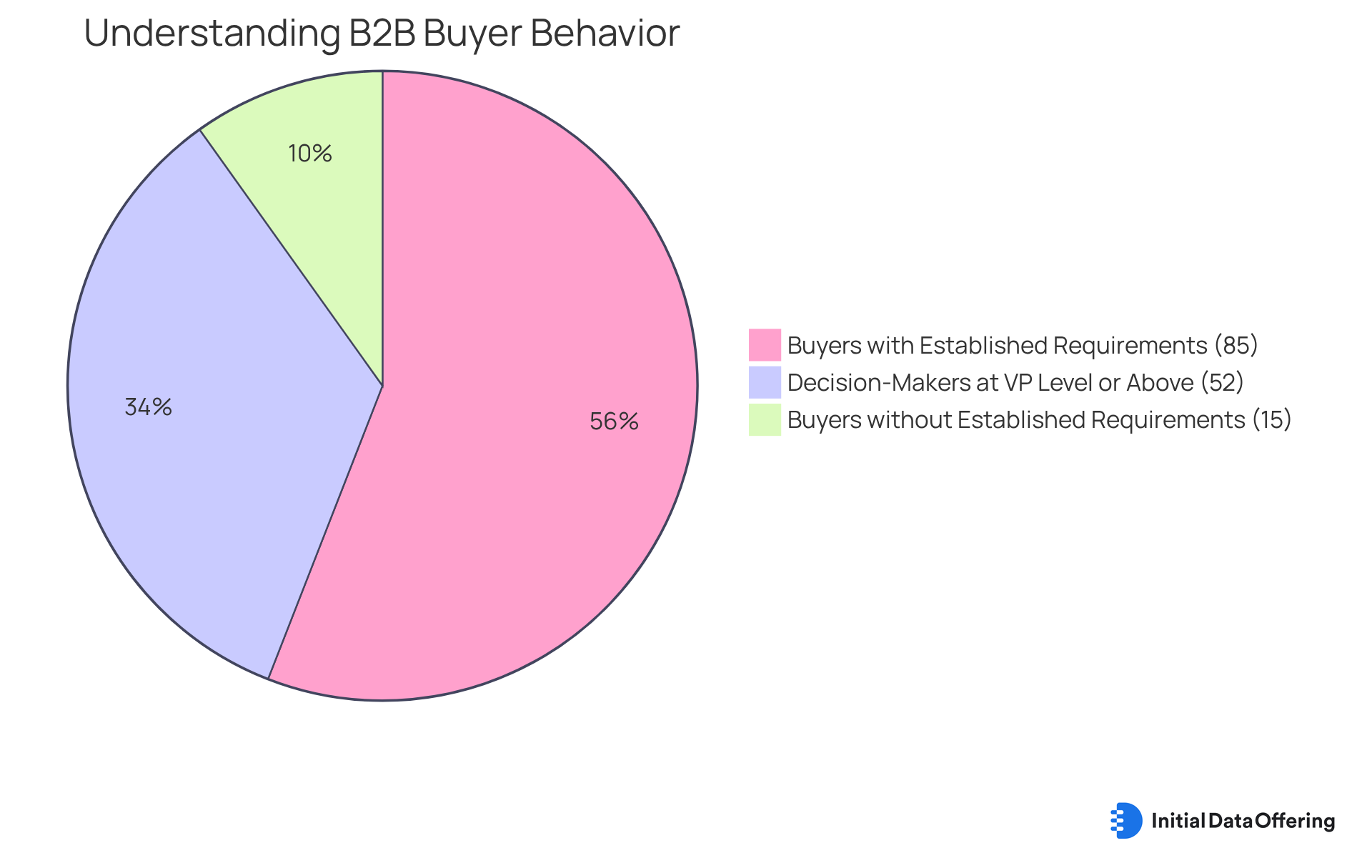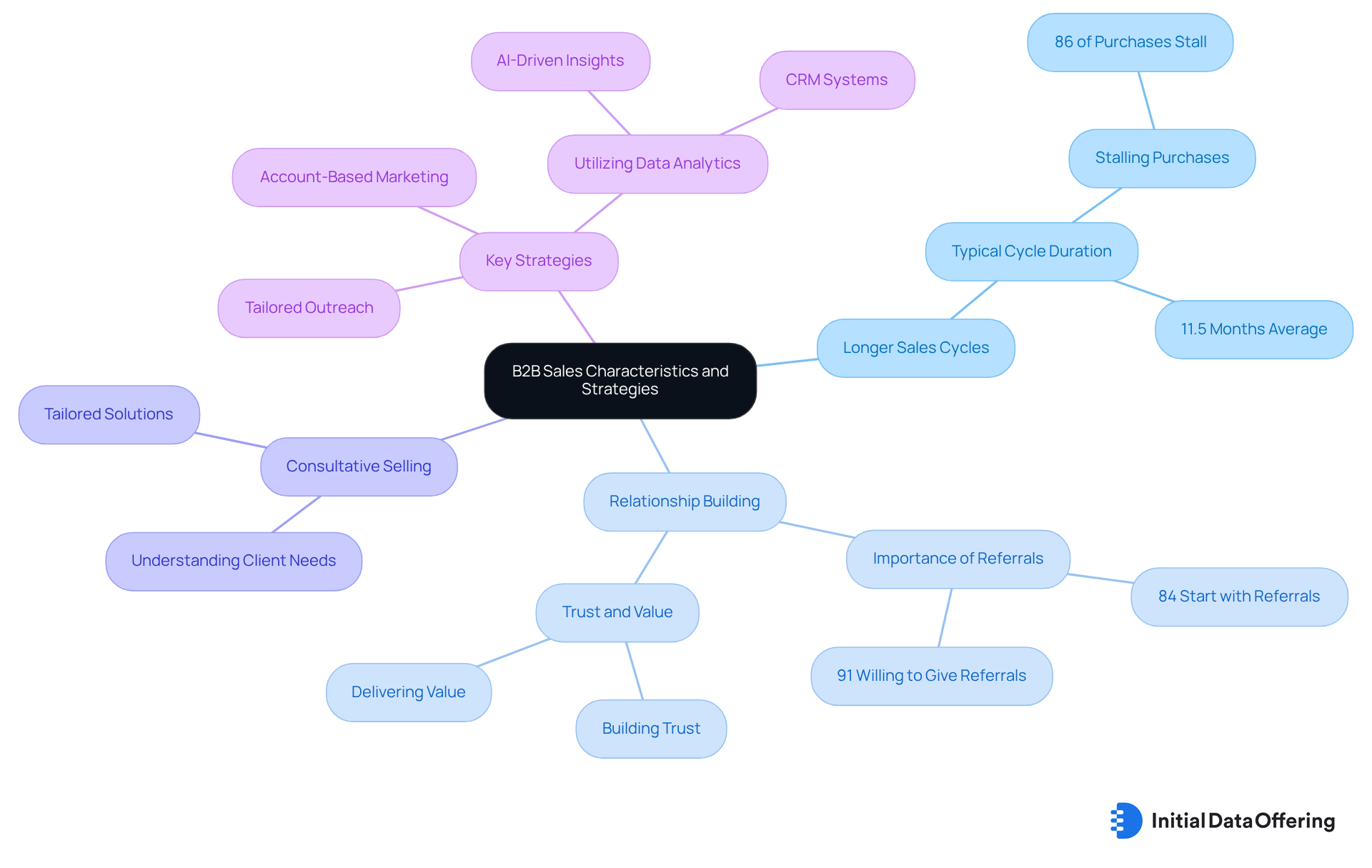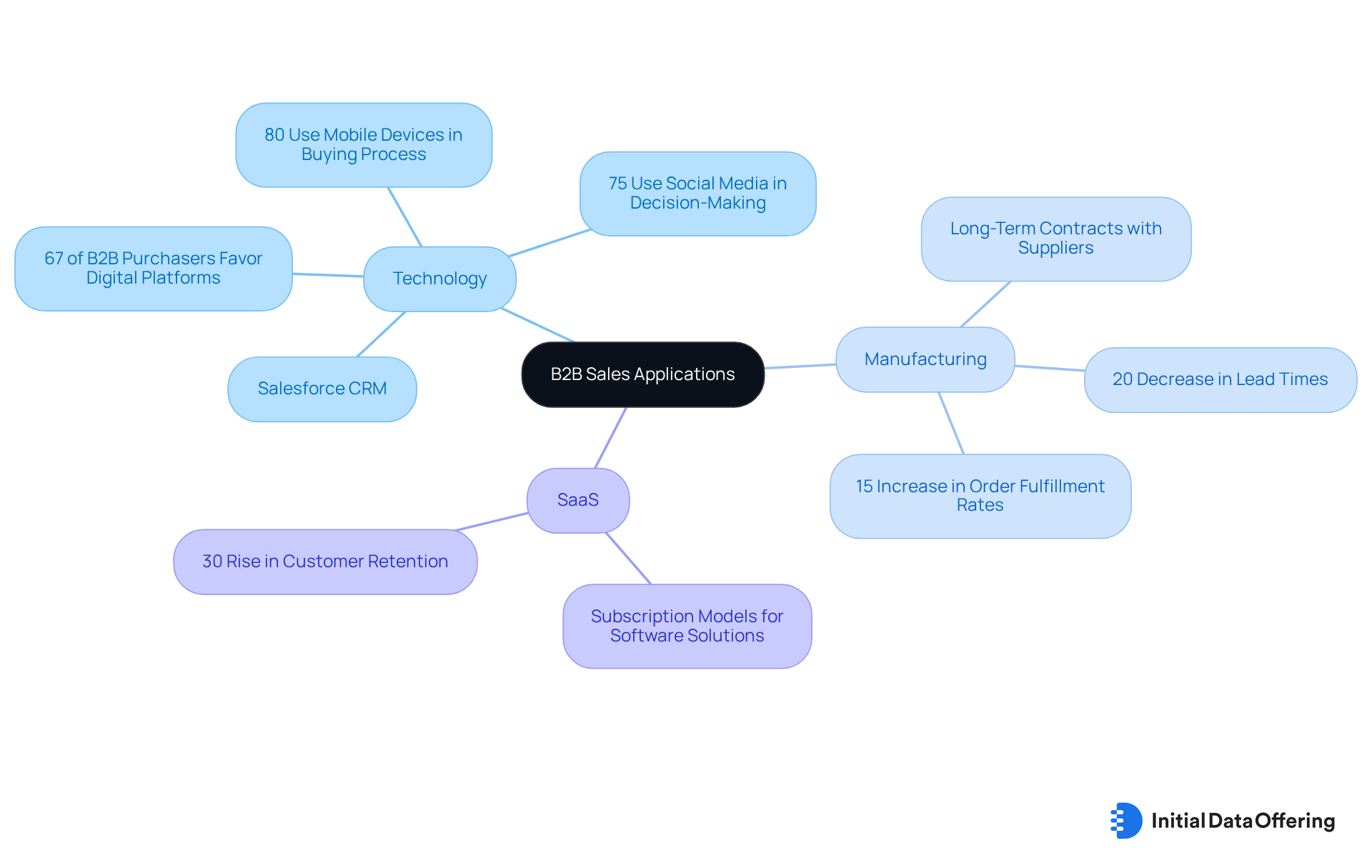What is B2B Sales? Key Concepts and Real-World Applications

What is B2B Sales? Key Concepts and Real-World Applications
Overview
B2B sales, or business-to-business sales, encompass transactions where one company sells products or services to another. These transactions are characterized by:
- Longer sales cycles
- Multiple stakeholders
- A strong emphasis on relationship-building
Successful B2B sales strategies leverage technology and data-driven insights, allowing companies to navigate the complexities of buyer needs effectively. This approach fosters strong partnerships that are essential for driving growth and innovation across various industries.
What are the implications of these strategies for your organization? By understanding the features of B2B sales, companies can recognize the advantages of adopting a relationship-focused approach. Ultimately, this can lead to enhanced collaboration and increased market competitiveness, benefiting all parties involved.
How can your team implement these insights to improve sales outcomes?
Introduction
B2B sales, or business-to-business transactions, serve as the backbone of the global economy, facilitating exchanges that shape industries ranging from technology to manufacturing. As companies increasingly rely on one another for products and services, grasping the intricacies of B2B sales becomes essential for navigating this complex landscape.
With the emergence of informed buyers and the growing significance of digital strategies, how can businesses effectively engage with multiple stakeholders and tailor their approaches to meet evolving expectations?
This article explores the core concepts, key characteristics, and real-world applications of B2B sales, offering insights that empower organizations to thrive in a competitive environment.
Define B2B Sales: Understanding the Core Concept
B2B transactions, or business-to-business transactions, involve exchanges where one company provides products or services to another. This model stands in contrast to B2C (business-to-consumer) transactions, where companies sell directly to individual consumers. B2B commerce typically involves larger transactions, longer cycles, and a more complex decision-making process, as multiple stakeholders are often involved in purchasing decisions. In fact, B2B purchasing groups can consist of approximately 11 members, each contributing distinct perspectives that can complicate the process. Understanding is vital for businesses aiming to successfully navigate the B2B landscape.
Effective B2B strategies frequently leverage insights from industry leaders and case studies. For instance, the integration of AI in commerce has led to a notable 40 percent increase in conversion rates. Furthermore, businesses that prioritize data-informed decision-making in their sales strategies are expected to experience significant growth and competitive advantages. As the B2B commerce landscape evolves, recognizing these complexities—such as the growing importance of social selling and personal branding—and adapting strategies accordingly is crucial for achieving success.

Contextualize B2B Sales: The Business Landscape and Its Importance
The B2B commerce environment plays a crucial role in , contributing a significant share of overall revenue. As companies increasingly rely on one another for products and services, the importance of [B2B transactions](https://initialdataoffering.com/about-us) continues to grow. This sector spans various industries, including technology, manufacturing, and services, and is defined by its emphasis on relationships and trust. In an era where digital transformation is reshaping enterprise operations, understanding [what is B2B sales](https://initialdataoffering.com/blog/what-is-data-scraping-definition-uses-and-key-considerations) becomes essential for firms striving to thrive in a competitive landscape.
Recent trends reveal that:
- 85% of buyers establish their purchase requirements prior to any seller contact.
- The average buying group expands to encompass 10-11 stakeholders—52% of whom are now decision-makers at the VP level or above.
This underscores the necessity for sellers to craft impactful content that resonates with buyers early in their purchasing journey. Cultivating strong relationships and aligning on problem definitions is vital for improving win rates. Sellers should equip themselves with insights that buyers cannot readily find online, thereby adding value to informed buyers.
To comprehend what is B2B sales, one must recognize that the integration of digital tools and strategies is not merely a trend; it is essential for navigating the complexities of contemporary B2B transactions. This approach ensures that businesses remain competitive and responsive to buyer needs. As companies adapt to these changes, the ability to leverage data and foster meaningful connections will be key to success in the evolving B2B landscape.

Explore Key Characteristics of B2B Sales: Processes and Strategies
What is B2B sales involves key characteristics of B2B transactions such as longer cycles, a focus on , and a consultative selling method. These features distinguish B2B from B2C transactions, where impulse purchasing is common. In B2B dealings, extensive research and negotiation are often required, emphasizing the need for sales teams to deeply understand their clients' needs and provide tailored solutions. Approaches such as:
- Account-based marketing
- Tailored outreach
- Utilizing data analytics to guide marketing tactics
are crucial for success in this arena.
Furthermore, the incorporation of technology, including CRM systems and AI-driven insights, is becoming increasingly vital in enhancing B2B transaction processes. For instance, 76% of B2B sales agents believe that technology is essential for finalizing agreements, highlighting its significant role in contemporary selling approaches. Additionally, 84% of B2B decision-makers initiate their buying process through referrals, underscoring the importance of building strong relationships. As buyers become more informed, with 91% arriving at meetings already familiar with vendors, the need for personalized and data-driven interactions becomes paramount.
Ultimately, what is B2B sales relies on successful transactions that depend on building trust, providing value, and adjusting approaches to meet changing buyer expectations. How can your organization leverage these insights to enhance its B2B strategies? By focusing on relationship-building and utilizing technology effectively, businesses can navigate the complexities of B2B transactions and drive success.

Illustrate B2B Sales with Real-World Examples: Applications Across Industries
Real-world applications of B2B transactions are evident across various industries, showcasing the versatility and impact of these strategies. In the technology sector, companies such as Salesforce illustrate how CRM solutions can enhance transactional workflows. This enhancement allows businesses to handle customer relationships more efficiently, ultimately benefiting their operations. Statistics indicate that 67% of B2B purchasers favor interacting with suppliers via digital platforms, highlighting the significance of technology in contemporary commercial interactions. Furthermore, 75% of B2B purchasers utilize social media content in their decision-making process, emphasizing the importance of social media in B2B marketing approaches.
In the manufacturing industry, suppliers often establish long-term contracts with manufacturers, ensuring a consistent supply of materials. This approach not only stabilizes production but also fosters strong partnerships that can lead to increased efficiency and reduced costs. For example, a case study on a prominent automotive parts provider showed that adopting a B2B approach led to a 20% decrease in lead times and a 15% rise in order fulfillment rates. This case illustrates how strategic partnerships can significantly enhance operational effectiveness.
Furthermore, Software as a Service (SaaS) companies frequently adopt subscription models to sell their software solutions to other businesses. This transition towards digital solutions is evident in the statistic that 80% of B2B purchasers use mobile devices during their buying process, emphasizing the need for flexible approaches. A significant instance is that experienced a 30% rise in customer retention following its shift to a subscription-based model. This demonstrates the efficacy of B2B commerce applications in the technology industry.
These examples collectively underscore what is B2B sales and its critical role in driving business growth and innovation. They demonstrate how companies across industries can leverage tailored approaches to meet their unique needs. How can your organization adapt these strategies to enhance its B2B interactions?

Conclusion
Understanding B2B sales is essential for navigating the intricate landscape of business transactions between companies. This model, characterized by its complexity, longer sales cycles, and reliance on relationships, highlights the importance of adapting strategies to meet the unique needs of various stakeholders involved in the purchasing process. As businesses increasingly engage in B2B transactions, recognizing the significance of data-driven insights and technological integration becomes crucial for achieving success.
Key insights discussed throughout the article reveal that effective B2B sales strategies hinge on:
- Relationship-building
- Tailored outreach
- Leveraging technology to enhance decision-making processes
The evolving dynamics of B2B commerce emphasize the necessity for sellers to understand buyer behaviors and preferences. How can businesses craft content that resonates with informed purchasers? Real-world applications across industries, from technology to manufacturing, illustrate the versatility and impact of B2B sales strategies. They showcase how businesses can thrive through strategic partnerships and innovative approaches.
Ultimately, the landscape of B2B sales presents both challenges and opportunities. Organizations are encouraged to embrace these insights and adapt their strategies accordingly, focusing on building trust and delivering value. By fostering meaningful connections and utilizing digital tools effectively, businesses can navigate the complexities of B2B transactions and drive sustainable growth in an increasingly competitive environment. The journey toward mastering B2B sales is ongoing; companies must remain vigilant and responsive to the changing trends and demands of the marketplace.
Frequently Asked Questions
What does B2B sales mean?
B2B sales, or business-to-business sales, refer to transactions where one company sells products or services to another company, as opposed to selling directly to individual consumers (B2C).
How do B2B transactions differ from B2C transactions?
B2B transactions typically involve larger transaction values, longer sales cycles, and a more complex decision-making process due to the involvement of multiple stakeholders, whereas B2C transactions are generally simpler and involve direct sales to consumers.
What is the average size of a B2B purchasing group?
A B2B purchasing group can consist of approximately 11 members, each bringing different perspectives to the purchasing decision.
Why is understanding B2B sales important for businesses?
Understanding B2B sales is vital for businesses to successfully navigate the B2B landscape and effectively engage in the complexities of B2B transactions.
What strategies can enhance B2B sales?
Effective B2B strategies often leverage insights from industry leaders, utilize case studies, and prioritize data-informed decision-making to drive growth and gain competitive advantages.
How has AI impacted B2B sales?
The integration of AI in commerce has resulted in a notable 40 percent increase in conversion rates for businesses.
What are some evolving trends in B2B commerce?
Key trends in B2B commerce include the growing importance of social selling and personal branding, which businesses need to recognize and adapt to for achieving success.